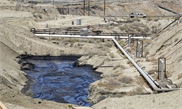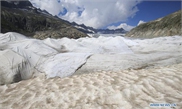Global temperatures reached record highs in 2020, say EU scientists
Global temperatures reach record highs; EU scientists call for action
The year 2020 tied with 2016 as the world's warmest on record, rounding off the hottest decade globally as the impacts of climate change intensified, the European Union's Copernicus Earth observation service said on Friday.
In the US, the warmer temperatures contributed to a record 22 separate disasters that each caused more than 1 billion dollars of damage, including wildfires and hurricanes, according to a new US government report.

With governments due to meet for a climate summit in Glasgow in November, the latest data prompted renewed calls for faster action to slash greenhouse gas emissions in line with the 2015 Paris Agreement to avoid catastrophic climate change.
"The key here is to - for every year and as quickly as possible - reduce the amount we emit, thus reducing the amount we actually add into the atmosphere," said Freja Vamborg, senior scientist at Copernicus.
In 2020, temperatures globally were an average of 1.25 C higher than in pre-industrial times, Copernicus said.
The Paris accord aims to cap the rise in temperatures to "well below" 2 C and as close as possible to 1.5 C to avoid the most devastating impacts of climate change.
The Arctic and northern Siberia continued to warm more quickly than the planet as a whole in 2020, with temperatures in parts of these regions averaging more than 6 C above a 30-year average used as a baseline, Copernicus said.
The region also had an "unusually active" wildfire season, with fires poleward of the Arctic Circle releasing a record 244 million tons of CO2 in 2020, over a third more than in 2019.
Arctic sea ice continued to deplete, with July and October.
In the US, the warmer temperatures contributed to a record 22 separate disasters that each caused more than 1 billion dollars of damage, including wildfires and hurricanes, according to a new US government report.

Photo taken on Aug. 5, 2018 shows the Rhone Glacier covered with white blankets near the Furka Pass in Switzerland. The Rhone Glacier is protected by special white blankets to prevent it from further melting as a result of global warming. Photo:Xinhua
Meanwhile, the fingerprints of climate change were also starkly visible in Europe, which experienced its hottest year on record in 2020, and in the Arctic and northern Siberia, which suffered extreme heat waves and fires, Copernicus said.With governments due to meet for a climate summit in Glasgow in November, the latest data prompted renewed calls for faster action to slash greenhouse gas emissions in line with the 2015 Paris Agreement to avoid catastrophic climate change.
"The key here is to - for every year and as quickly as possible - reduce the amount we emit, thus reducing the amount we actually add into the atmosphere," said Freja Vamborg, senior scientist at Copernicus.
In 2020, temperatures globally were an average of 1.25 C higher than in pre-industrial times, Copernicus said.
The Paris accord aims to cap the rise in temperatures to "well below" 2 C and as close as possible to 1.5 C to avoid the most devastating impacts of climate change.
The Arctic and northern Siberia continued to warm more quickly than the planet as a whole in 2020, with temperatures in parts of these regions averaging more than 6 C above a 30-year average used as a baseline, Copernicus said.
The region also had an "unusually active" wildfire season, with fires poleward of the Arctic Circle releasing a record 244 million tons of CO2 in 2020, over a third more than in 2019.
Arctic sea ice continued to deplete, with July and October.




